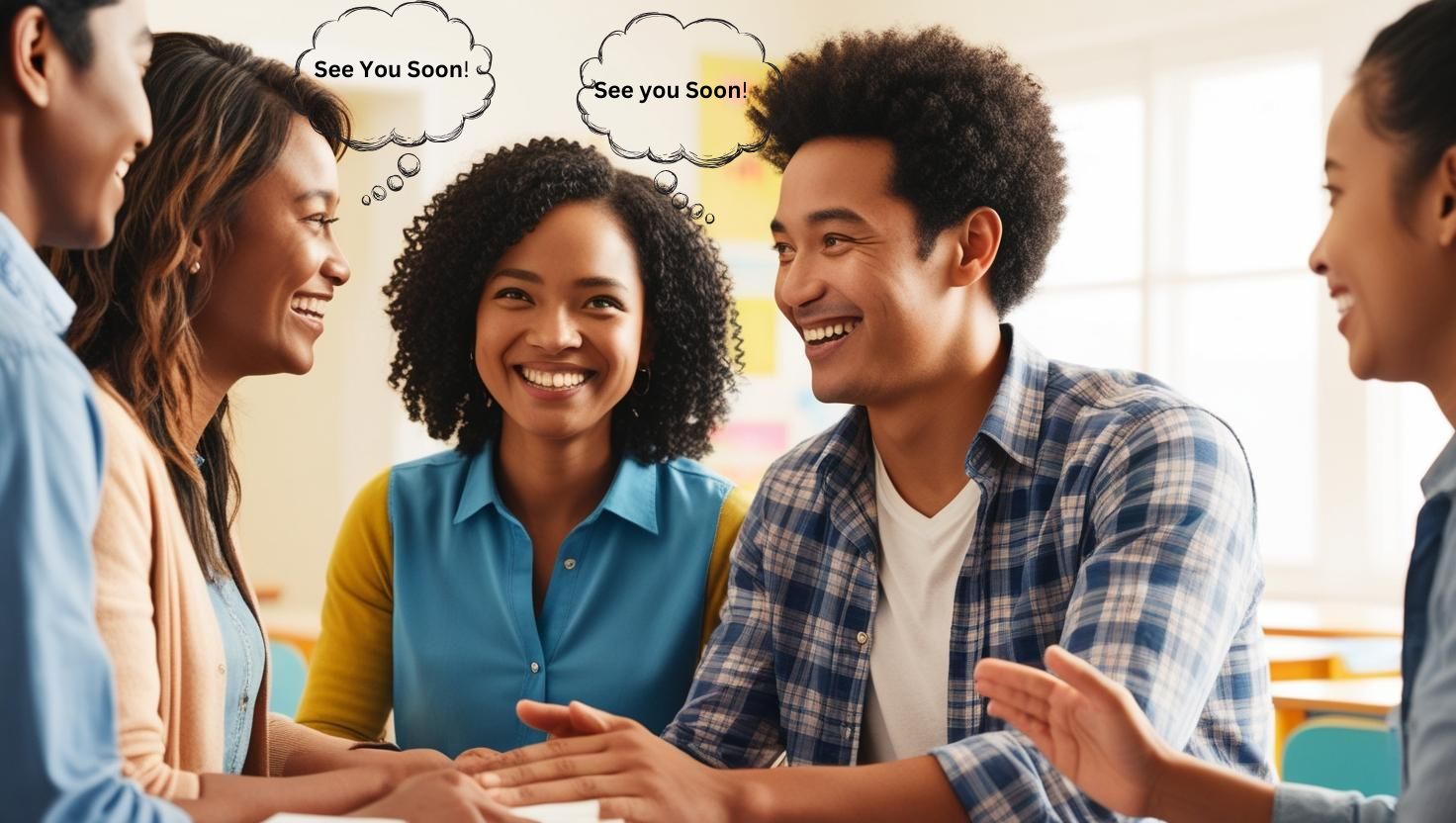Learn how to say goodbye in English with confidence! This beginner-friendly ESL lesson covers common farewells, formal vs. informal goodbyes, real-life conversations, interactive exercises, and a fun quiz. Perfect for adult English learners looking to improve their speaking skills!

Why Are Goodbyes Just as Important as Greetings in English?
Goodbyes are just as important as greetings because they signal the end of a conversation politely and leave a lasting impression. Whether in casual or professional settings, using the right farewell shows respect, strengthens relationships, and ensures smooth communication. Mastering goodbyes helps build confidence in everyday English conversations.
Saying goodbye might seem simple, right? But for English learners, it’s key to dive into the most common phrases first. Whether you’re leaving a party or ending a phone call, the right words can make all the difference.
Start with the basics like ‘Bye,’ ‘Goodbye,’ or even ‘See you later.’ These are your go-to phrases no matter what. Easy to remember and super useful. They work in almost any situation, so keeping them in your vocabulary toolkit is a must.
Then there’s ‘Take care.’ A bit more caring and personal. It’s like you’re saying, “Hey, I want you to be alright.” Perfect for friends or family. You’re sending them off with a little warmth.
Ever heard ‘Catch you later’? It’s casual and kind of playful, often used with buddies. It’s more common in some English-speaking countries than others, but it’s good to know for those informal settings.
Understanding the cultural context behind each phrase is also crucial. For example, ‘Farewell’ might sound fancy, and it is—often reserved for more formal or permanent goodbyes like when someone kicks off a long trip or moves away.
Getting these phrases under your belt not only boosts confidence but also opens doors for smoother and more engaging conversations. So, add these expressions to your language practice and spice up your English goodbye game!
Navigating Formality: Distinguishing Formal and Informal Goodbyes
Nailing the right formality when saying goodbye can really set the tone for your interactions. In English, just like in many languages, how you say goodbye changes based on who you’re speaking to and where you are.
| Farewell | Response |
|---|---|
| Goodbye! | Goodbye! |
| Bye! | Bye! |
| See you later! | See you! |
| Take care! | You too! |
| Have a nice day! | Thanks, you too! |
| See you soon! | See you soon! |
| Farewell! | Farewell! |
| Good night! | Good night! |
| Catch you later! | Later! |
When you’re in a work meeting or talking to someone older or you want to show respect, ‘Goodbye’ is your best friend. It’s straightforward and carries a respectful tone. And if you’re writing an email, you might even say ‘Kind regards’ or ‘Sincerely’ at the end—those are just written forms of a formal goodbye.
On the flip side, when you’re with friends, informal is usually the way to go. ‘See ya,’ ‘Catch you later,’ and ‘Later’ are solid choices. Remember, informality typically means there’s a shared comfort or casual relationship, like chatting with a friend after class or shooting the breeze with coworkers after hours.
A silly rhyme that my students seem to enjoy, that I often say at the end of class is, “See you later alligator”. I learned that when I was just a kid. It’s informal but it’s catchy. Try it with friends or people you know well.
Sometimes people say “See you later ‘gator”

Notably, understanding when to switch between these styles is key. Misusing formal language in an informal setting might sound stiff or even funny, while being too casual in formal contexts can seem disrespectful or even incorrect. Context matters a ton here, so always read the room for cues on the right words to use!
Formal vs. Informal Goodbyes
- Formal: Goodbye, Farewell, Have a nice day, Good night.
- Informal: Bye, See you later, Catch you later, Later.
💡 Tip: Use formal goodbyes in professional settings and informal ones with friends.
Knowing when and how to use these different forms of goodbye not only improves your language skills but also helps you fit right in, whether you’re mingling at a party or participating in a professional setting.
Putting Theory into Practice: Example Conversations in Saying Goodbye
Understanding goodbye phrases is great, but putting them into practice is where it all comes together. Let’s check out some scenarios to see how you might use different goodbyes.
Example Conversations
🗣️ Formal Conversation:
Person A: It was nice meeting you. Have a great day!
Person B: It was nice meeting you too. Take care!
👥 Informal Conversation:
Person A: Alright, I gotta go. Catch you later!
Person B: Later!
Imagine you’re leaving a dinner party with friends. A friendly ‘Bye, everyone!‘ or a ‘Catch you all later!‘ fits perfectly. It’s warm and signals you’re comfortable with the group.
Now, think about closing a meeting with your boss. You’ll likely want to keep it professional with a ‘Thank you, goodbye,’ or even, ‘I appreciate your time. Goodbye.’ This keeps the tone respectful and clear.
Picture saying farewell at the end of a phone call with a family member. This could be as simple as ‘Take care, talk soon!’ It shows you care and look forward to the next chat.
Crafting these conversations helps solidify your understanding and makes it easier to recall when you’re actually in the moment. Practicing these scenarios with a partner can also boost your confidence and get you more comfortable saying goodbye in different contexts.
Immersive Learning: Practice Exercises to Master Saying Goodbye
Ready to put your new skills to the test? Practice is where the magic happens. Let’s look at a few fun and effective ways to get comfortable with saying goodbye in English.
Practice Exercises
✍ Fill in the blanks:
- ____! See you tomorrow.
- Have a nice ____, see you later!
- I have to go now. ____ you later!
🎧 Speaking Practice:
- Practice saying each farewell aloud.
- Try using a farewell with a study buddy.
Role-playing is a fantastic method. Partner up with a friend or fellow learner and create different goodbye scenarios. How would you say goodbye after a day at work? Or maybe after a lunch date with a friend? Keep switching roles so you get a feel for using both formal and informal expressions.
Interactive activities like flashcards or apps can also keep you engaged. These tools give you a fast-paced way to remember and use phrases that suit different situations, helping reinforce what you’ve learned and keeping it fresh in your mind.
Another brilliant trick? Try incorporating goodbyes into your daily conversations. At home, practice saying ‘Goodbye’ or ‘See ya!’ as you leave a room. This repetition helps you build natural language habits in comfortable settings.
Alongside this, participating in group activities or language clubs provides great exposure. Conversational practice with multiple people boosts your confidence and helps you understand how different English speakers might use these phrases.
By consistently practicing, not only will you sound more natural, but you’ll also be that much closer to fluency. These exercises help bridge the gap between knowing the words and using them effortlessly.
Interactive Quiz
📌 Get Access to the Quiz! To take the quiz and test your knowledge, sign up below to receive the free lesson materials. Once signed up, you’ll get a direct link to the quiz in your email!
👉 Sign up below to receive access to this quiz and other exclusive learning materials!
💬 Practice with a Study Buddy!
- Find a partner and practice saying goodbyes.
Final Thoughts
Mastering different ways to say goodbye helps you feel more confident in conversations and improves your ability to communicate naturally in English. Whether in formal or informal situations, using the right farewell can leave a positive impression. Keep practicing, and soon, saying goodbye in English will feel completely natural!
I’m more of an informal guy. I am formal when I need to be but that’s not very often.
An informal way that I forgot to mention above is “bye bye”. Many people use it.
Another one that I didn’t mention above, that is commonly used when people talk on a two-way radio, although I use it often is, “over and out”
I say it when I’m online on Zoom after I’ve said good bye. It’s the last thing I say before I log off.
Next Lesson Preview: Introducing Yourself in English!
What about you?
What do you think?
What’s your favorite way to say good bye?
I’d love to hear/see your thoughts. Leave them in the comments section below.
I always reply.
See you in the next lesson! 😊


This was a really interesting read! I totally agree that how we say goodbye can leave a lasting impression. In my experience, mastering both formal and informal farewells is essential, especially when transitioning between professional and casual settings. I’ve often used “Take care” with friends and family, as it feels warm and sincere. On Zoom calls, though, I admit I’ve been guilty of saying “over and out” for fun—it’s a bit quirky but always gets a smile!
What’s your favorite way to say goodbye? I’d love to hear how others mix things up depending on the situation. Great article!
Hi Herman, thanks for your comments. I don’t really have a favorite way to say good-bye. It depends on my mood and the situation. I vary it with my students just to show them there are a variety of ways. I guess the one I use most is “See you later”.
KBob